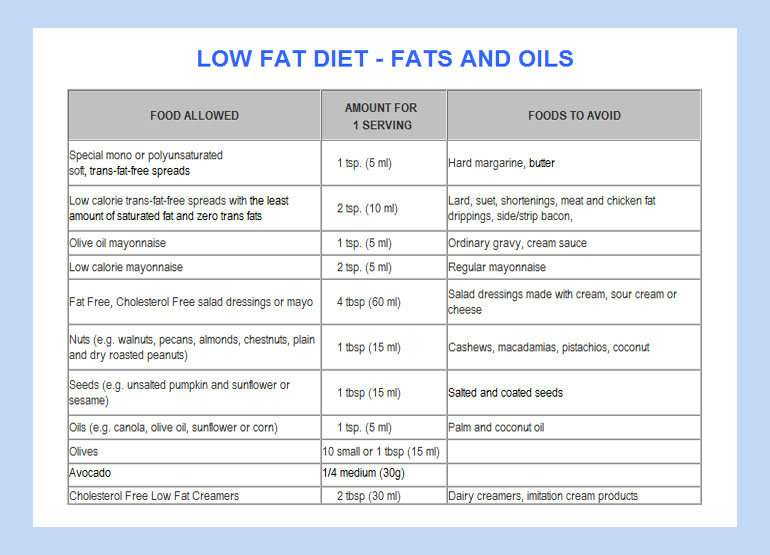Health Pages
Fats & Oils in Low Fat Diet
Fats & Oils in Low Fat Diet
Poly and monounsaturated fats help you to lower your blood cholesterol levels. Even though you are using allowed fats, limit your intake because too much can cause weight gain.
One serving of fat contains 45 calories.
Limit saturated and trans fats. Try to eat plenty of plant foods (such as vegetables, fruits, and whole grain products) and a moderate amount of lean (low-fat) animal based food (meat and dairy products) to help control your fat, cholesterol, carbs and calories intake. Fats are important foodstaf for many forms of life and belong to a group od substances called lipids. Fats serve both as energy sources for the body, and as stores for energy in excess of what the body needs immediately. Fats carry the fat-soluble vitamins A, D, E, and K; they can only be digested, absorbed, and transported in conjunction with fats. Learn more...
READ LABELS!
Always read nutrition labels on food packages. They will show the number of grams of fat per serving and calories per serving.
On soft spreads, olive, canola, sunflower, safflower, corn, or soybean oil will be the first ingredient.
Always choose a soft, trans-fat-free spreads sold in a tub NOT the stick or brick type of margarine.
Quality spreads are labeled with "Nutrition Information" for an 8 gram serving. If a spread is not labeled, don't buy it.
Choose spread based on its content of mono or polyunsaturated fat. Look on the label under nutrition information.
Add up the grams of polyunsaturates and monounsaturates. If the total is 6 grams or more for an 8.0 gram (2 tsp.) serving, then it is a good choice for a regular spread. A light spread would contain 3.0 grams or more in a 2 tsp. or 10 ml serving.
EXAMPLE:
TOTAL FAT 8.0 GRAMS
POLY (good) 3.2 GRAMS
MONO (good) 3.3 GRAMS
Determine product acceptability IF the total fat content is NOT 8.0 grams.
EXAMPLE:
POLY + MONO X 100% is equal or greater than 75%
Total Fat
Did You Know?
Related Info:
 Cholesterol Content of Commonly Used Foods
Cholesterol Content of Commonly Used Foods
 Triglycerides
Triglycerides
 Meat & Meatless Cooking
Meat & Meatless Cooking
 Making Change
Making Change
 About Fats
About Fats
 Fat Facts
Fat Facts
 Low Fat Diet
Low Fat Diet
 Fat and Fibre Tips
Fat and Fibre Tips
 Fat Scoreboard
Fat Scoreboard
 Test Your Fat I.Q.
Test Your Fat I.Q.
 Set Your Goals
Set Your Goals
 Eating Well
Eating Well
 Healthy Eating
Healthy Eating
 DASH Eating Plan
DASH Eating Plan
 Watch Your Salt
Watch Your Salt
 Learn How to Season Your Food Without Salt
Learn How to Season Your Food Without Salt
 Start Cooking
Start Cooking
 Did You Know?
Did You Know?
 Diet and Eating Out
Diet and Eating Out
 Take the Quiz
Take the Quiz
 Healthy Eating Recipes
Healthy Eating Recipes
 Heart Disease
Heart Disease
" There is not enough evidence to conclude that saturated fats that exist in nature (non-hydrogenated) increase the cholesterol levels or the risk of heart disease, but replacing the saturated fat with healthy fats (like monounsaturated and polyunsaturated fats) is usually recommended for heart healthy diet."



